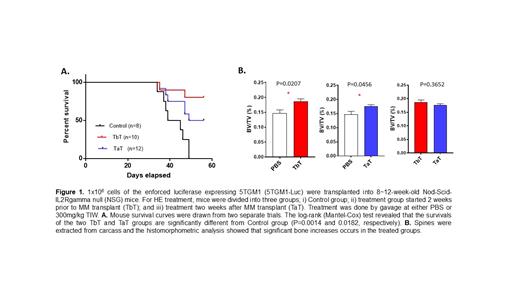Abstract
Introduction
Multiple Myeloma (MM) is a plasma cell malignancy that, despite advances in treatment, remains incurable. In over 90% of MM patients, aberrant bone remodeling occurs and results in osteolytic lesions. It severely reduces the patient's quality of life and increases mortality. Korean traditional medicine has a long-standing interest in healthy foods to enhance the immune system, energy-boost, and Yin-and-Yang balance. A healthy diet in Tradition medicine is based on accumulated observations from countless cases over multi-centuries. Traditional medicine has used herbal extracts (HE) from natural plants with fewer side effects and long-term treatment tolerance. In earlier studies, lycii radices cortex (LRC) and achyranthes japonica (AJ) containing herbal extracts (HE) have demonstrated the ability to enhance cell growth and mineralization of osteoblast cells while also inhibiting osteoclast differentiation. Furthermore, a sesquiterpene glucoside, (1'R,3'S,5'R,8'S,2 Z,4 E)-dihydrophaseic acid 3'-O-β-d-glucopyranoside (DPA3G) were isolated from the LRC ethanol extract and shown to be a bioactive compound for enhancement of cell growth and bone anabolic activity (Park et al). The current study investigated the effects of LRC+AJ containing HE on murine 5TGM1 MM-bearing mice.
Methods
We transplanted 1x10 6 cells of the enforced luciferase-expressing 5TGM1 (5TGM1-Luc) into 8~12-week-old Nod-Scid-IL2Rg null (NSG) mice via tail vein (representing an equal number of each sex). For LRC+AJ containing HE treatment, mice were divided into three groups; i) PBS group; ii) treatment group at 300 mg/kg, gavage, TIW started two weeks before MM transplant (TbT); and iii) treatment group at 300 mg/kg, gavage, TIW two weeks after MM transplant (TaT). We assessed tumor burden by weekly bioluminescence imaging (IVIS 200 Imager, Perkin Elmer). The spine was extracted from carcass and scanned at postmortem by Dual Energy X-ray Absorptiometry using PIXImus Densitometer (G.E. Lunar, Madison, USA) and micro-computed tomography (microCT; Scanco Medical AG, Switzerland).
HE effects in cell growth were tested in the myeloma cells (5TGM1 and U266) and preosteoblast cells (MC3T3-E1). The cells were grown in various concentrations (8, 80, 800 ug/ml) of HE up to 96 hours. In addition, Chromatogram and Mass Spectrometry were conducted to identify the DPA3G.
Results
As shown in Figure 1A, this HE significantly increased the mouse survivals of both TbT and TaT groups with median survivals of undetermined and 52.5 days, respectively, while MM control had a median survival of 42 days. The Mantel-Cox test found that TbT and TaT mice were significantly different from the control group (P=0.0014 and 0.0182, respectively). Furthermore, DEXA scans at postmortem showed a significant increase in bone mineral density (BMD) and bone mineral content (BMC) in TbT and TaT groups than control MM mice. For a histomorphometry analysis, the spines were scanned by micro-CT and revealed that TbT and TaT groups had significantly increased bone volume over total volume (BV/TV) than control. To see if HE affects cell growth of myeloma cells and osteoblast cells, we further investigated the HE on preosteoblast cell line MC3T3-E1, mouse MM cell line 5TGM1-Luc, and human MM cell line U-266. Cells were treated with HE in various concentrations, and viability was assessed at 48 and 96 hours post-treatment. Remarkably, LRC+AJ containing HE increased MC3T3-E1 cell growth while it decreased 5TGM1 and U-266 cell viability. We identified the DAP3G and many other compounds in HE used in this study.
Conclusions
Our results demonstrated that LRC+AJ HE prevents MM and promotes bone formation in 5TGM1 engrafted NSG mice. We also found that LRC+AJ HE suppresses myeloma cell growth and enhances osteoblast cell survival. Although it is yet to be defined, a correlation of osteoblast activity and myeloma cell inhibition suggests a potential mechanism of the HE action to prevent MM progression.
1. Park E, Kim J, Yeo S, Lim E, Choi CW, Choi S, Li WY, Lee JW, Park JH, Huh D, Jeong SY. Anti-Osteoporotic Effects of Combined Extract of Lycii Radicis Cortexand Achyranthes japonica in Osteoblast and Osteoclast Cells and Ovariectomized Mice. Nutrients. 2019 Nov 9;11(11):2716. doi: 10.3390/nu11112716. PMID: 31717518; PMCID: PMC6893723.'
Huh: Dongwoodang Pharmacy Company: Current Employment.
Herbal Extracts from Lycii Radicis Corex and Achyranthes Japonica


